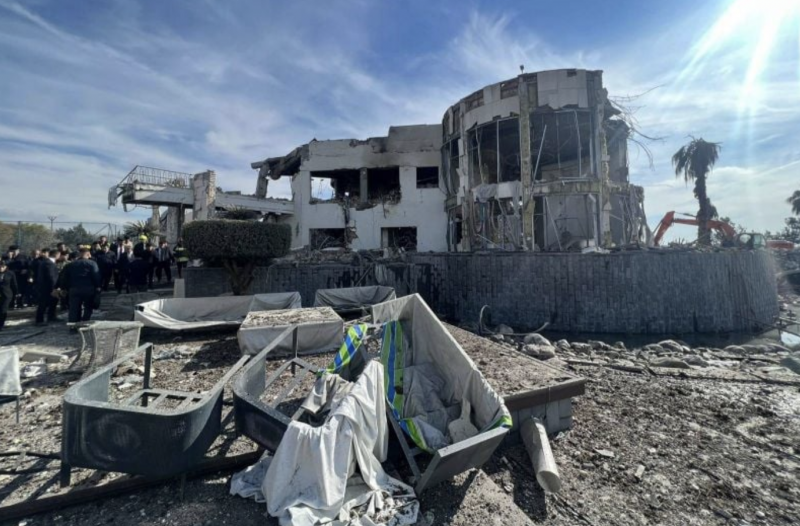
This photograph, taken and published on Jan. 16, 2024 by the Kurdistan 24 news channel, shows a damaged building at a site hit by a missile attack launched by Iran's Islamic Revolutionary Guard Corps (IRGC), in Erbil, Iraqi Kurdistan. (Credit: Kurdistan24/AFP)
Iraq has taken an unusually tough stance against Iran, after missile fire from the Iranian Revolutionary Guard Corps (IRGC) killed at least four people in Erbil on Monday evening, including a Kurdish businessman and his baby.
Baghdad has lodged a complaint with the United Nations Security Council against Tehran's “aggression,” the Iraqi Foreign Ministry subsequently said in a statement. It added that “this flagrant violation of the sovereignty of the Republic of Iraq strongly contradicts the principles of good neighborliness and international law, and threatens the security of the region.”
Iraq also recalled its ambassador to Tehran on Tuesday. Iraqi Kurdish Prime Minister Masrour Barzani, a close associate of the murdered businessman, cancelled a meeting with Iranian Foreign Minister Hossein Amir-Abdollahian on the sidelines of the Davos Economic Forum, Reuters reported.
The latter claimed that Iran had shared intelligence with Iraq on what he considered to be the activities of Mossad, Israel's foreign intelligence service, in Iraqi Kurdistan, the news agency reported. This information was denied by Baghdad.
How can we analyze the Iraqi government's reaction to its Iranian ally? Zmkan Ali Saleem, Associate Fellow at the Chatham House think tank, provided an answer to L’Orient-Le Jour.
What impact could Iraq's response have on relations between Baghdad and Tehran?
Iraq's response is symbolic, but powerful. [It is] symbolic because it is not coercive towards Iran and has no impact on its military capabilities, but forceful because it is the first time the Iraqi government has taken such strong measures towards Iran. [This is] taking into account the solid relations between the two countries since 2003, and the coming to power of the Shiite parties aligned with Tehran, as well as the militias operating on the ground.
Mohammad Shia al-Sudani [Iraqi Prime Minister] has acted pragmatically, taking these measures despite the fact that he has no coalition government, and is weak in the sense that he was brought to power by pro-Iranian Shiite parties.
He has done so because Iran's strikes are an attack on Iraqi sovereignty, and he wants to avoid unrest that could lead to a collapse of Iraq's fragile political process. But there are groups and figures very close to Iran, who exert control over parties within the parliamentary coalition and over the government, such as former Prime Minister Nouri al-Maliki, but also Qais al-Khazali, leader of the Asaib al-Haq party and Hadi al-Amiri of the Badr movement. None of them would allow Baghdad's response to go beyond the symbolic stage.
Is al-Sudani hoping to make internal political gains in this way?
This attack has indeed aroused anger in Iraq, even among Shiites who are usually rather aligned with Tehran, because this time Iraqi citizens were killed. They saw it as a violation of their sovereignty and unjustified Iranian aggression, since it is obvious that there is no Mossad headquarters in Erbil.
The Kurds would be suicidal if they accepted this when Iran and its powerful army are their immediate neighbors [editor's note: there is trade between Kurdistan and Israel, particularly in oil]. And just because part of the government's parliamentary coalition is aligned with Tehran, doesn't mean it endorses all its actions. National security advisor Qasim al-Araji, who hails from Shiite parties close to Iran, said that Iranian allegations that it was a Mossad base were unfounded. As the Iraqi Defense Minister put it, Baghdad could even suspend a security agreement signed with Tehran, which called on the Iraqi government to suppress anti-Iranian armed groups operating mainly in Kurdistan, on the border between the two countries.
Does Iraq intend to assert its sovereignty over its entire territory, including Kurdistan?
In general, people want the Iraqi government to be more assertive in protecting its sovereignty. This applies not only to Iranian attacks, such as Monday's, but also to US strikes, which recently killed a commander of the Popular mobilization Units (PMU) [a coalition of armed groups close to Iran].
Iran, which is unable to attack the Americans and Israelis directly, has found an easy target in Erbil, to send a message to the whole region about the extent of its ability to cause harm.
It was very important for al-Sudani to react to this attack, especially as the Kurds don't really consider themselves Iraqis at heart. So, the central government doesn't want to give them any more evidence to suggest that they're not Iraqis. Al-Sudani is trying to act in such a way as not to alienate everyone.
This article was originally published in L'Orient-Le Jour. Translated and edited by Yara Malka.